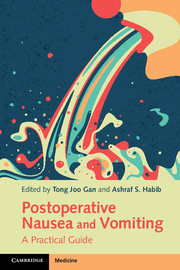8 results
Copyright page
-
- Book:
- Postoperative Nausea and Vomiting
- Published online:
- 05 March 2016
- Print publication:
- 29 March 2016, pp iv-iv
-
- Chapter
- Export citation
Contents
-
- Book:
- Postoperative Nausea and Vomiting
- Published online:
- 05 March 2016
- Print publication:
- 29 March 2016, pp vii-vii
-
- Chapter
- Export citation
Index
-
- Book:
- Postoperative Nausea and Vomiting
- Published online:
- 05 March 2016
- Print publication:
- 29 March 2016, pp 183-187
-
- Chapter
- Export citation
Preface
-
- Book:
- Postoperative Nausea and Vomiting
- Published online:
- 05 March 2016
- Print publication:
- 29 March 2016, pp xiii-xiv
-
- Chapter
- Export citation
Foreword
-
- Book:
- Postoperative Nausea and Vomiting
- Published online:
- 05 March 2016
- Print publication:
- 29 March 2016, pp xi-xii
-
- Chapter
- Export citation
Dedication
-
- Book:
- Postoperative Nausea and Vomiting
- Published online:
- 05 March 2016
- Print publication:
- 29 March 2016, pp v-vi
-
- Chapter
- Export citation
Contributors
-
- Book:
- Postoperative Nausea and Vomiting
- Published online:
- 05 March 2016
- Print publication:
- 29 March 2016, pp viii-x
-
- Chapter
- Export citation

Postoperative Nausea and Vomiting
- A Practical Guide
-
- Published online:
- 05 March 2016
- Print publication:
- 29 March 2016



